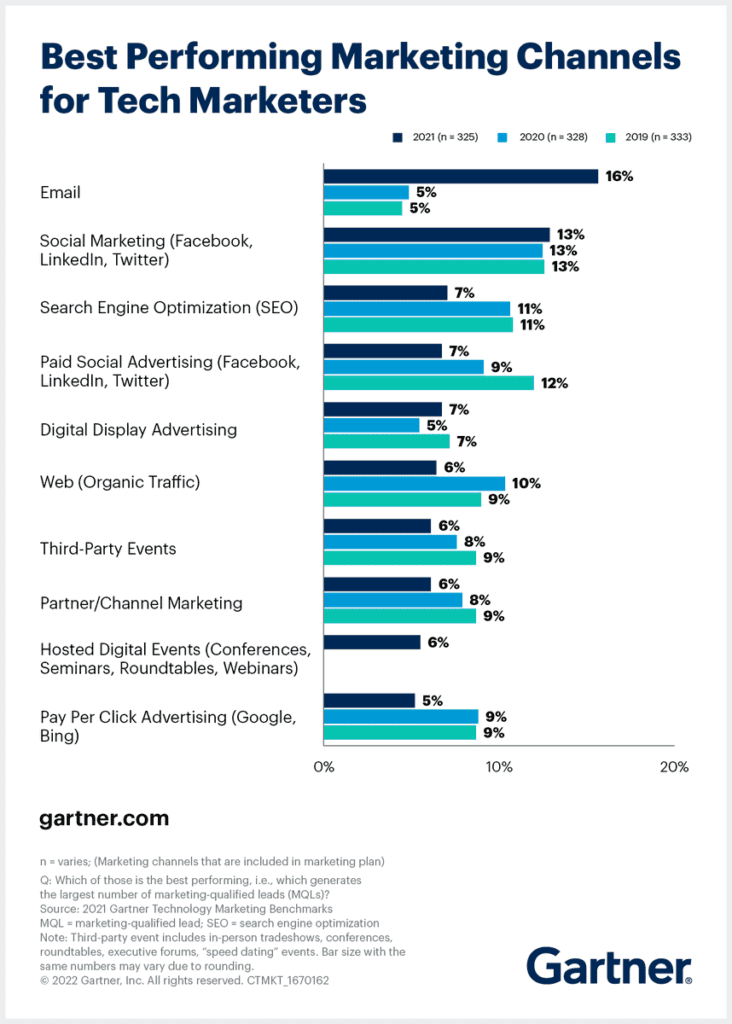Q: What are the best marketing techniques for an early-stage SaaS startup?
My list of things that almost always work:
- Try everything — and Double Down on anything that works. If your price point is very low, this sometimes doesn’t work. But in general, most startups find that, at best, 1–2 channels really work for them. It could be a partner program, or an app listing. It could be content marketing. It could be targeted outbound. In the early days, it’s magic if anything works at all. So don’t be frustrated if the ROI is higher than you’d hoped, or the yield lower. If it works at all, keep doing it. You’ll get better at it.
- Do more for, and with, your existing customers. They will market for you for free — just slowly. But they are the best marketers of all. In the end, 30%-80% of new leads for most SaaS companies come from word-of-mouth and similar referrals. So do a digital event. Do customer dinners. Do weekly webinars where you highlight The Customer of The Month. Do more customer marketing. Do 6 customer Zooms a week as CEO. More on that here.
- Free isn’t (usually) a marketing strategy. Just making your product Free doesn’t attract users. It may — or may not — increase the odds they use it, and eventually pay, once they find you. But don’t waste too much time thinking Free is marketing strategy per se. It’s not marketing. At least, “Free” isn’t demand-generating on its own.
- Focus on whatever you are 10x better in your competitive and other marketing. You probably aren’t really better than the competition in many places, but you may be in 1 or 2 niches or key features. Focus your energy there, so the 10%-20% of prospects looking for a new vendor will know why to pick you. More here.
- Be a true subject matter expert in your content marketing. This seems to always work if you take it very seriously. Write 3–5 incredible blog posts on how to do something important in your industry. SEO somehow seems to do its magic here if the posts are incredibly valuable. PR firms want you to be a “thought leader,” and that’s hard. But what’s less hard is being a subject matter expert in your own content marketing. A great example in here.
- Make every email truly sell the product — for real. Too many startups waste their list and email campaigns. Challenge yourself. Is the copy of your emails to prospects so good, they’d want to buy just based on the email? If so, your connect rates will be high. Aim for high connect rates in most cases. Fewer, better, hand-crafted emails that explain your 10x features and why you win. A related post here.
- More ABM, less spam and break-up emails. Related to the prior point, but different. When you are starting off, you’re almost always better off carefully crafting 100 great emails, customized to good prospects … than spamming 1000 prospects. A truly customized email, written for a very particular buyer, often will at least get read. That’s a start. That 10,000th email in Promotions? Not so often. A related post here.
- Be where the competition is. Too many startups shy away from the events, the channels, and the other places their competition is. That’s wrong. You don’t need to win every deal as an upstart. You just want to get into them. That’s why you usually want to show up wherever the Big Guys are. At least to get into a conversation with their prospects and customers.
- Do a high-quality weekly webinar, and invite your growing list to it every week. This almost always works over time. Each week, do a webinar. Even if just a few people show up, that shows intent. Mix it up a bit, but always start with a demo. You can mix it up with customer case studies, “how to” sessions, and more. Just make sure each one adds value. If you do, over time, folks from your list will come to it, send their teammates, and more. A deeper dive here.
- Don’t waste scarce money on agencies if you don’t know exactly what you are doing here. Later, agencies can be magical to help you scale in areas you don’t have full-time resources. But in the early days, it can be hard to tell who to use, and what to expect. A mediocre agency often has negative ROI.

A related post here:


